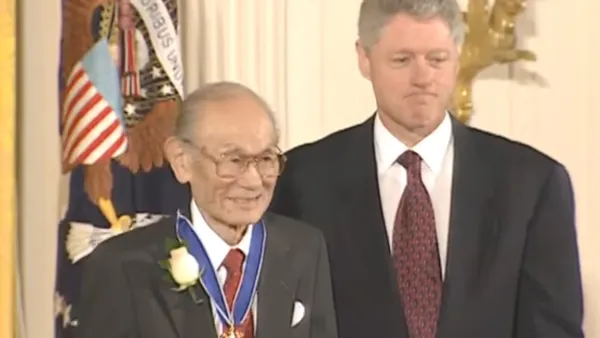Asian Pacific American Heritage Month is observed throughout May to pay tribute to the achievements of generations who have contributed to American life. The federal courts join in celebrating their accomplishments at every level of the Third Branch of government.
In 1992, the official designation of May as Asian Pacific American Heritage Month was signed into law. The month of May was chosen to commemorate the immigration of the first Japanese to the United States on May 7, 1843, and to mark the anniversary of the completion of the transcontinental railroad on May 10, 1869. The majority of the workers who laid the tracks were Chinese immigrants. Find more information at The Library of Congress.
Korematsu v. U.S. - Educational Activity
In times of war, courts are sometimes asked to balance individual rights and public safety. What are the lessons to be learned from the tensions arising out of this case?
In 1998, Fred Korematsu was awarded the Presidential Medal of Freedom. His journey to that day started during World War II when he refused to be forced into a Japanese-American relocation center where families lived in horse stalls at an abandoned race track until they were sent to remote internment camps in the West. Learn more about Korematsu v. U.S. and engage your students in a court- and class-ready activity, formatted for immediate use.
Pathways to the Bench
Among the Asian Pacific Americans serving at every level of the federal court system are U.S. District Court Judge Lorna G. Schofield, in New York City, and two U.S. Court of Appeals judges, all of whom administer the Naturalization Oath of Allegiance to new citizens at naturalization ceremonies. U.S. Court of Appeals Judge Denny Chin, whose chambers are in New York City, and U.S. Court of Appeals Judge Jacqueline Nguyen, whose chambers are in Pasedena, California, are naturalized citizens who now swear in new citizens using the same oath they took.
Their first-person narratives are among a growing collection of Pathways to the Bench videos about judges who have faced adversity and now serve on the federal bench.
Inspired by the dreams of her mother, U.S. District Court Judge Lorna G. Schofield, New York City, worked hard to meet the highest standards of excellence. Due to her mother’s illness, she had to adapt to long stays with other families as a child, and shouldered adult responsibilities as a teen. Judge Schofield’s message to young people: “You have to have faith in yourself that you can make a life that you want.”
U.S. Court of Appeals Judge Denny Chin, of New York City, is the grandson of a waiter and the son of a cook in Hell's Kitchen. He adopted the family’s work ethic that elevated him to the federal bench. Now Judge Chin presides over the kind of naturalization ceremonies that made three generations of his family U.S. citizens.
U.S. Court of Appeals Judge Jacqueline Nguyen, of Pasedena, California, had to flee Vietnam with her family when she was a little girl. Rebuilding their lives in Los Angeles required the hard work of every family member. Along the way she learned a lesson that she shares with young people: “Have the courage and work ethic to accept opportunities that will shape your life.”
Susan Oki Mollway, First Asian American Woman on Bench
As a Japanese American, Judge Susan Oki Mollway never considered herself disadvantaged while growing up in the multicultural environment of Hawaii. So, she was surprised, when she was nominated to the federal bench in 1998, to learn she was the first Asian woman to serve as an Article III federal judge.
Korematsu v. U.S. — Balancing Liberties and Safety
In times of war, courts are sometimes asked to balance individual rights and public safety. What are the lessons to be learned from the tensions arising out of this case? Learn more in Korematsu v. U.S.

